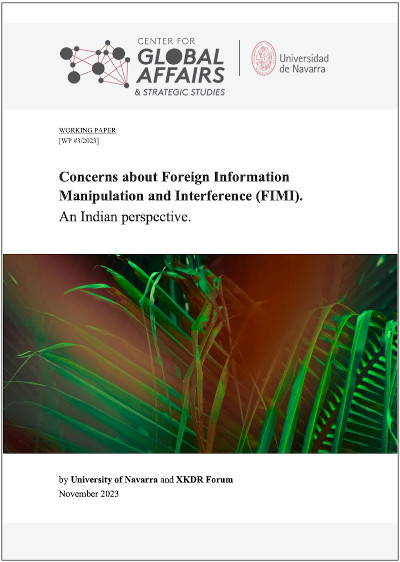In the image
Penetration/Camouflage. Garden in Lucknow, India [Shivam]
EXECUTIVE SUMMARY
The member states of Global North organisations like the North Atlantic Treaty Organisation (NATO) and the European Union (EU) see the Russian Federation (hereinafter, “Russia”) and the People’s Republic of China (hereinafter, “China”) as primary threats to their security and stability. In this context, a new threat is posed by FIMI, which specifically refers to non-illegal patterns of behaviour as opposed to disinformation that covers specific content. While indications of perpetrating FIMI activities can be seen in countries across the world, we focus specifically on Russia and China due to the scale and reach of their operations which have been singled out by NATO and EU member states.
In our report, we offer a uniquely Indian perspective on FIMI. India’s uniqueness comes from its sheer size and population, its position as a democracy with relatively free access to the Internet, and also the importance of its large English-speaking population with a sophisticated English-language press. The Indian outlook on Russia and China is very different from those of Global North countries — India saw China as an adversary much before the NATO did, and India does not see Russia as an adversary at all.
Russia and China have different motivations, both for FIMI in general as well as its specific application to India. While Russia seeks to promote discord and distrust among the targeted audience by “confusing, overwhelming and entertaining” the audience, its motivations in India are simpler and are primarily driven by a desire to retain the level of relevance that the Soviet Union once had in India. Specifically, it seeks to present the conflict in Ukraine in favourable terms to promote the strength of its economy, particularly its arms industry, to secure favourable orders.
China, on the other hand, seeks to obtain primacy in the global discourse. It does so by promoting its narrative in favourable terms while engaging in influence operations to strengthen its bargaining position. Regarding India, Chinese objectives for FIMI are twofold: (i) geostrategic primacy, and (ii) competition for influence over other South Asian countries and other countries in the Global South.
When we think of solutions for India, we should address the specific problem of FIMI without opening the door to unintended consequences brought about by low state capacity. This is why we offer solutions that involve research, partnership and cooperation between the government of India, its innovative private sector, research and philanthropic organisations in India as well as in other countries, as well as the global technology giants. This field is ripe for the development of Digital Public Goods (DPGs) and common standards where the EU, its member states, and civil society organisations could certainly play an important role.


